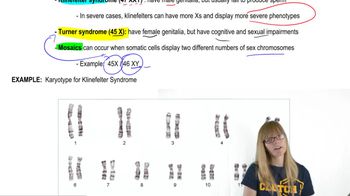Table of contents
- 1. Introduction to Genetics51m
- 2. Mendel's Laws of Inheritance3h 37m
- 3. Extensions to Mendelian Inheritance2h 41m
- 4. Genetic Mapping and Linkage2h 28m
- 5. Genetics of Bacteria and Viruses1h 21m
- 6. Chromosomal Variation1h 48m
- 7. DNA and Chromosome Structure56m
- 8. DNA Replication1h 10m
- 9. Mitosis and Meiosis1h 34m
- 10. Transcription1h 0m
- 11. Translation58m
- 12. Gene Regulation in Prokaryotes1h 19m
- 13. Gene Regulation in Eukaryotes44m
- 14. Genetic Control of Development44m
- 15. Genomes and Genomics1h 50m
- 16. Transposable Elements47m
- 17. Mutation, Repair, and Recombination1h 6m
- 18. Molecular Genetic Tools19m
- 19. Cancer Genetics29m
- 20. Quantitative Genetics1h 26m
- 21. Population Genetics50m
- 22. Evolutionary Genetics29m
3. Extensions to Mendelian Inheritance
Sex Chromosome
Problem 1d
Textbook Question
Textbook QuestionIn this chapter, we have focused on sex differentiation, sex chromosomes, and genetic mechanisms involved in sex determination. At the same time, we found many opportunities to consider the methods and reasoning by which much of this information was acquired. From the explanations given in the chapter, you should answer the following fundamental questions?
How do we know whether or not a heteromorphic chromosome such as the Y chromosome plays a crucial role in the determination of sex?
 Verified Solution
Verified SolutionThis video solution was recommended by our tutors as helpful for the problem above
Video duration:
1mPlay a video:
Was this helpful?
Key Concepts
Here are the essential concepts you must grasp in order to answer the question correctly.
Heteromorphic Chromosomes
Heteromorphic chromosomes are pairs of chromosomes that differ in size, shape, or genetic content, such as the X and Y chromosomes in humans. The Y chromosome is significantly smaller and contains fewer genes than the X chromosome, which is crucial for understanding its role in sex determination. The presence of a Y chromosome typically indicates male sex in many organisms, as it carries the SRY gene responsible for initiating male development.
Recommended video:
Guided course

Chromosome Structure
Sex Determination Mechanisms
Sex determination mechanisms refer to the biological processes that dictate the development of sexual characteristics in an organism. In many species, including humans, the presence of specific sex chromosomes (XX for females and XY for males) triggers a cascade of genetic and hormonal events that lead to the development of male or female phenotypes. Understanding these mechanisms is essential for evaluating the role of the Y chromosome in sex determination.
Recommended video:
Guided course

Sex Determination
Genetic Evidence and Experimental Approaches
Genetic evidence and experimental approaches involve the use of various techniques, such as gene knockout studies, chromosomal mapping, and comparative genomics, to investigate the functions of specific genes and chromosomes. These methods help researchers determine the role of the Y chromosome in sex determination by observing the effects of its absence or alteration on sexual development. Such evidence is critical for establishing the Y chromosome's importance in the sex determination process.
Recommended video:
Guided course

Descriptive Genetics

 4:24m
4:24mWatch next
Master Sex Determination with a bite sized video explanation from Kylia Goodner
Start learningRelated Videos
Related Practice


